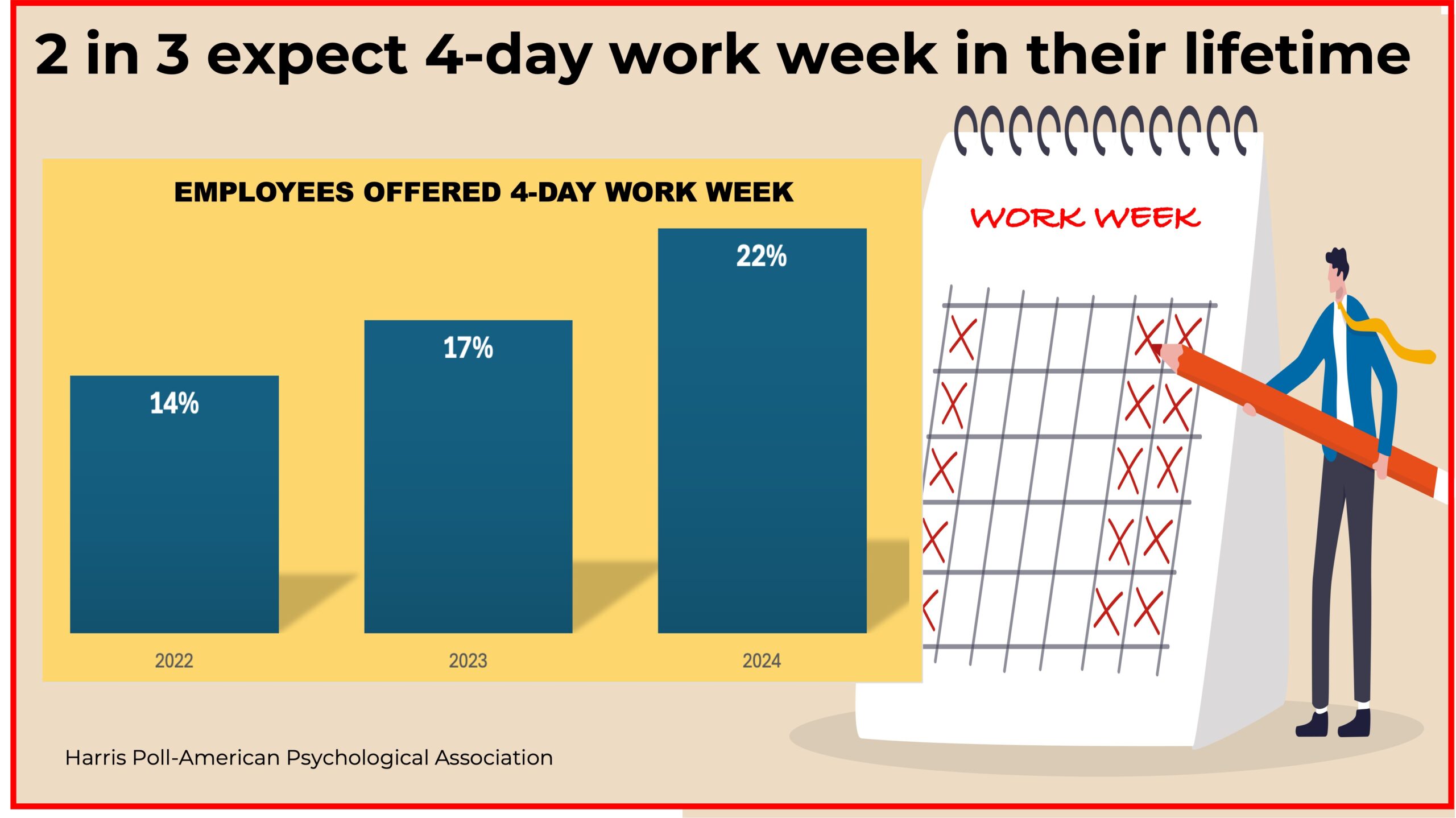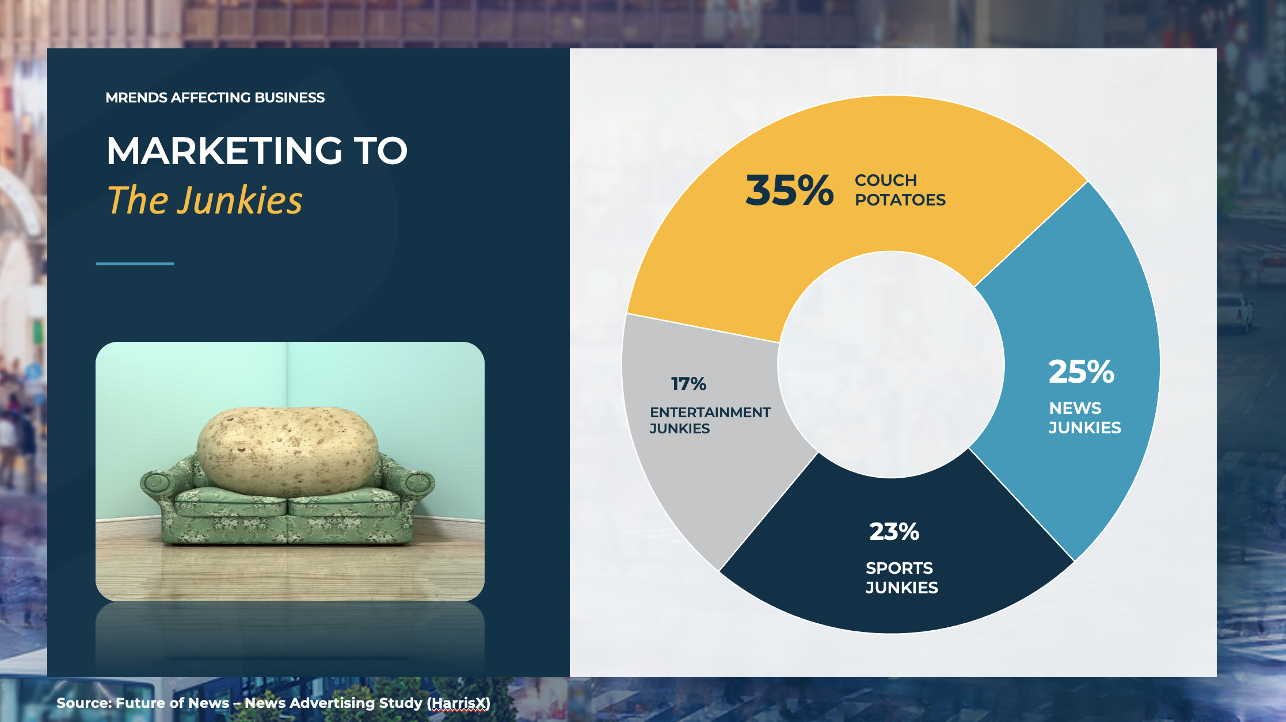Weekly Data
WHAT THE DATA SAY: 67% believe 4-day workweek will become standard in their lifetime
By: Ray Day
CONTACT:
We wanted to share our latest consumer and business insights, based on research from Stagwell. Among the highlights of our weekly consumer sentiment tracking:

4-DAY WORKWEEK ON THE HORIZON?
The percentage of workers reporting that their employer offers four-day workweeks is higher this year than the previous two years (22% today compared with 17% in 2023 and 14% in 2022), according to the “2024 Work in America Survey” by The Harris Poll with the American Psychological Association.
- 81% of workers say that, if they worked four days a week, they could be just as effective but happier at work.
- 67% of U.S. workers believe the four-day workweek will become standard in their lifetime.
- 67% report at least one outcome of workplace burnout in the last month, including lack of interest, motivation, low energy, feeling lonely or isolated and a lack of effort at work.
- 33% are not working in their preferred location, be it remote, in person or a hybrid of the two.
- 59% currently work all in person, 24% hybrid and 17% completely remotely.
- 38% of workers would prefer to work all in person, compared with 34% who prefer to work hybrid and 28% who prefer to work remotely.
- 35% of employees use AI monthly or more often to assist with their work.
- Yet only 18% know if their employer has an official policy on using AI. Half say their employer has no such policy, and 32% are unsure.
- Younger employees are struggling: 45% of workers ages 18–25 feel lonely when they are working, significantly higher than workers ages 26–43 (33%), 44–57 (22%), 58–64 (15%) and 65+ (14%).
- Younger workers also are more likely than older workers to say they feel tense or stressed during their workday (48% are tense/stressed among those ages 18–25, 51% for ages 26–43, 42% ages 44–57, 30% ages 58–64 and 17% ages 65+).
CONTENT CREATORS DISCONNECTED FROM BRANDS
Brands and independent content creators/influencers – people who are paid by companies to develop entertaining and educational material for social– and owned-media channels – often are not speaking the same language, according to our Harris Poll research with Creator Rosetta Stone.
- 81% say brands are losing sales because of poor coordination between their content and checkout experience.
- 85% of creators say they never hear brand feedback about how their content is evaluated or what brands think of their work.
- 89% say they have audience insights that brands fail to access.
- 82% say their communities want to see themselves reflected in brand campaigns and, if brands don’t use diversity consistently, it feels less trustworthy.
LGBTQ+ EMPLOYEES WANT BETTER WORKPLACE SUPPORT
LGBTQ+ employees say they need more support in the workplace and when applying for new jobs, according to our Harris Poll study with Indeed.
- 52% of LGBTQ+ employees report that their company offers an employee resource group for LGBTQ+ employees.
- Yet 29% of LGBTQ+ workers say they feel their employers can do “a better job.”
- 30% of LGBTQ+ people and 50% of transgender job seekers have refused to apply for a position due to a company’s lack of support for LGBTQ+ issues.
- LGBTQ+ employees will not work for a company that has a history of LGBTQ+ discrimination lawsuits (48%) or negative reviews about LGBTQ+ treatment (43%).

MORE NEWS JUNKIES THAN SPORTS ONES
One in four Americans consider themselves news junkies, which underscores the benefit of businesses and advertisers investing in news – along with protecting democracy, according to Stagwell’s “Future of News” project.
- In a 50,000-person survey, 35% of Americans described themselves as “couch potatoes,” 25% as news junkies, 23% sport junkies and 17% entertainment junkies.
- Stagwell convened two panels at this week’s Cannes Lions Festival, continuing the discussion around the facts showing ads placed in quality news sources adjacent to articles on provocative and polarizing topics had no negative impact on brand favorability – despite fears of “brand safety.”
- For more on Stagwell’s SPORT BEACH buzz, see this link.
ICYMI
In case you missed it, check out some of the thought-leadership and happenings around Stagwell making news:
Related
Articles
In the News, Press Releases, Thought Leadership
Jun 10, 2025
Stagwell (STGW) Chairman and CEO Mark Penn to Discuss the Irreplaceable Power of Human Creativity on the Main Stage of Cannes Lions

Events, In the News, Press Releases, Talent & Awards
Jun 05, 2025
Code and Theory Named ANA B2B Agency of the Year After Transforming the World’s Leading Brands

In the News, Press Releases, Talent & Awards
May 19, 2025
Stagwell (STGW) Appoints Connie Chan as Chief Growth Officer for Asia Pacific





